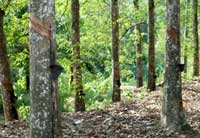What is claimed as the first genetically modified (GM) rubber has landed the soils of Assam. According to reports, the GM rubber, which was developed at the Rubber Research Institute of India(RRII), has been trialled by the Rubber Board at its Sarutari research farm in Guwahati early this week.
The genetically modified crop is “tolerant” of the climatic conditions in the mountainous northeast region, specifically, the severe cold conditions during the winter season, and characterised by “progressive drying of the soil”, which affect the growth of young rubber plants, KN Raghavan, Chairman and Executive Director of Rubber Board, said. As explained in reports, the GM rubber has the MnSOD (manganese-containing superoxide dismutase) gene, which can protect plants from the adverse effects of severe environmental stresses. The gene is obtained from the rubber plant itself, cloned in the laboratory, and reinserted into a cell of the rubber plant.
Related: Indian Rubber Board backs molecular biotech research for better rubber clones, yield
He assured that “there are no plant species in India that can breed with natural rubber. Thus, there is no risk of the genes flowing from the GM rubber into any other native species.”
The trial, according to Raghavan, has followed all mandatory bio-safety measures applicable to field trials involving GM crops.
Related: ATMA: High-quality natural rubber essential in tyre manufacturing
Earlier, the RRII had developed via breeding and selection two high yielding hybrid clones of rubber that are adapted to the climatic conditions of the northeast region.
Recently, the northeastern states, including Assam, have been a focus of invigorated rubber plantation activities . The Automotive Tyre Manufacturers’ Association (ATMA), has launched an Rs 1,100-crore five-year project to plant rubber in 200,000 hectares in the north eastern states to bolster the country’s rubber production.

